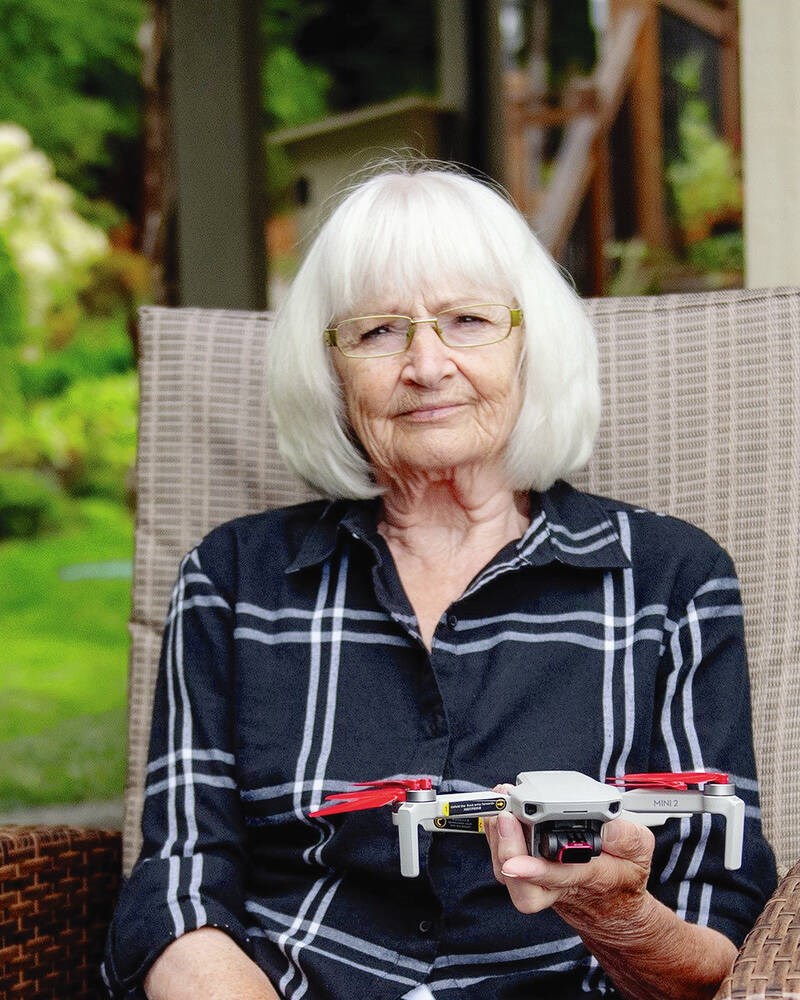A Union Bay woman who has been flying drones over an industrial operation where ships are dismantled is declaring a win, after the Supreme Court of B.C. dismissed parts of a counter-claim to her lawsuit against the company.
Mary Reynolds has been using a 250-gram drone with a high-resolution camera to capture footage of Deep Water Recovery’s activities that she shares on her web page and on YouTube.
Reynolds and her supporters fear the business on 111 acres south of Courtenay results in the release of harmful pollution into the environment.
She had filed suit against the company seeking damages, after she says she was confronted aggressively in a parking lot in June 2022 and her drone was taken without her consent, then returned broken three days later. She also said another confrontation occurred a few days later.
Reynolds is asking the court for general, special damages for the replacement cost of her drone, aggravated damages and punitive damages.
Deep Water Recovery filed a counter-claim, however, calling the drone flights intrusive and a hazard for distracted employees working with heavy machinery and high up on derelict ships.
It said that the drone trespassed into its property, including airspace, that it was a nuisance, and that disseminating videos constituted a privacy violation.
The company sought damages for trespass and nuisance, as well as punitive damages.
Justice Gareth Morley, however, dismissed the company’s bid for punitive damages against Reynolds, along with its complaint about Reynolds sharing video footage.
Punitive damages, he said, are for “wrongful acts that are so malicious and outrageous that they are deserving of punishment on their own. There is simply no basis for suggesting that any of Ms. Reynolds’ conduct reaches this standard.”
Reynolds has a constitutional right to publicly oppose Deep Water Recovery’s operations and contribute to the debate on whether they should continue, Morley said.
The company “characterizing it as ‘malicious,’ ‘wrongful’, ‘high-handed’ and ‘deserving of rebuke’ is not just over-the-top-rhetoric, but troubling in itself in a pleading. Ms. Reynolds no doubt would like to see DWR’s operations shut down, but that is her right.”
Still to be decided, however, is if the drone flying in the airspace above the company’s operations constitutes a breach of privacy and a nuisance.
“The occupier of the land has a right to exclude from the immediate air space up to some height. How that height is defined, however, is uncertain,” Morley said.
Reynolds called the April 8 decision “very good news.”
But Mark Jurisich, Deep Water Recovery’s main shareholder, also declared it a win, noting the questions of whether the drone constitutes a breach of privacy and nuisance must still be determined.
Jurisich maintains there is no pollution from what he called a much-needed recycling facility for retired barges and ships that is permitted to operate by government regulators. In the past three years, it has recycled 15,000 tonnes of steel that was turned into rebar, he said.
As far as any presence in the site’s groundwater of substances such as copper, the property is a registered contaminated site, Jurisich said, since it was used historically as a wood and coal waste landfill and there was also a copper mine in the area.
Deep Water Recovery’s lawyers are appealing an abatement order from the province issued earlier this year, Jurisich said.
The order required the company to stop releasing pollution and to monitor and report any discharges on its site. It comes with a potential fine of up to $300,000.
Jurisich said if pollution was found in groundwater at the site, it’s likely from past uses, noting that when it’s raining, groundwater will pool in areas where the business is not operating.



